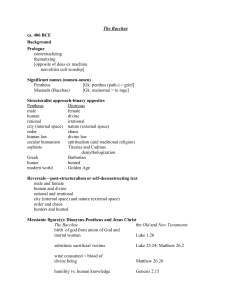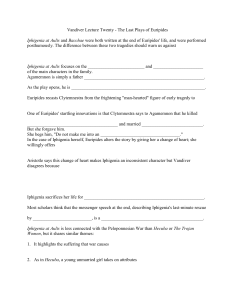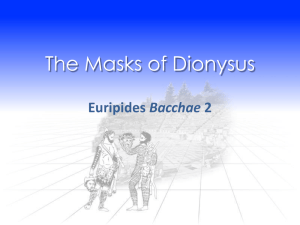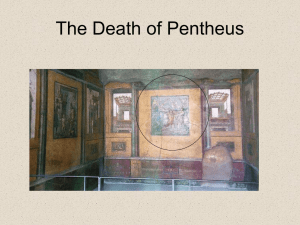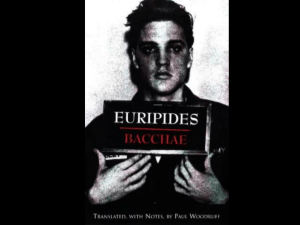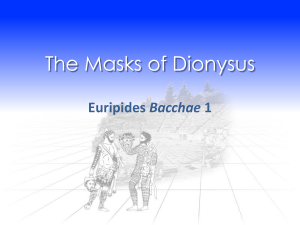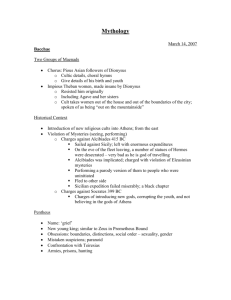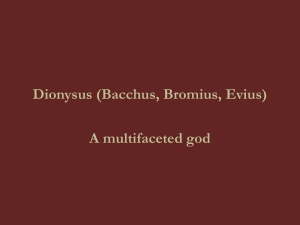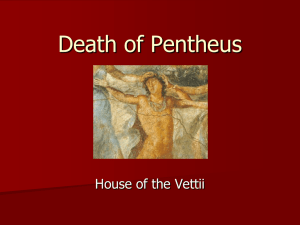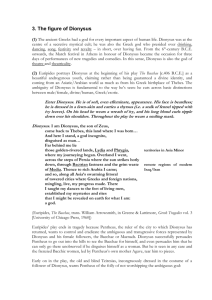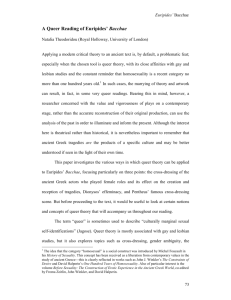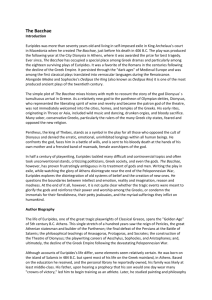Text specific advice: The Bacchae
advertisement
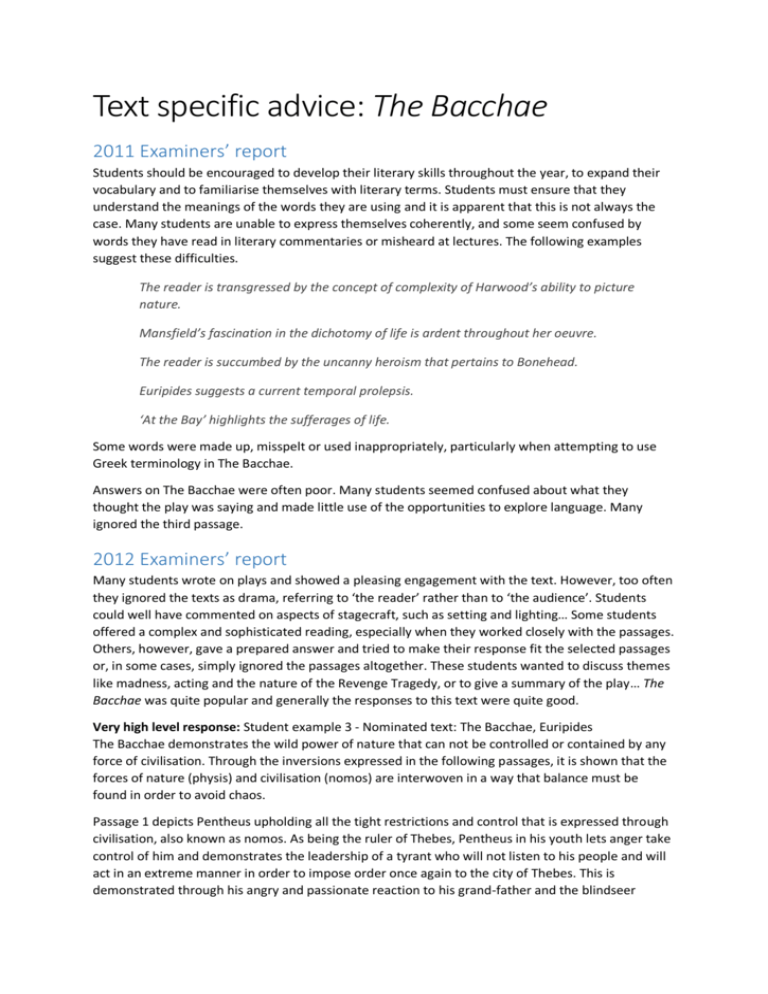
Text specific advice: The Bacchae 2011 Examiners’ report Students should be encouraged to develop their literary skills throughout the year, to expand their vocabulary and to familiarise themselves with literary terms. Students must ensure that they understand the meanings of the words they are using and it is apparent that this is not always the case. Many students are unable to express themselves coherently, and some seem confused by words they have read in literary commentaries or misheard at lectures. The following examples suggest these difficulties. The reader is transgressed by the concept of complexity of Harwood’s ability to picture nature. Mansfield’s fascination in the dichotomy of life is ardent throughout her oeuvre. The reader is succumbed by the uncanny heroism that pertains to Bonehead. Euripides suggests a current temporal prolepsis. ‘At the Bay’ highlights the sufferages of life. Some words were made up, misspelt or used inappropriately, particularly when attempting to use Greek terminology in The Bacchae. Answers on The Bacchae were often poor. Many students seemed confused about what they thought the play was saying and made little use of the opportunities to explore language. Many ignored the third passage. 2012 Examiners’ report Many students wrote on plays and showed a pleasing engagement with the text. However, too often they ignored the texts as drama, referring to ‘the reader’ rather than to ‘the audience’. Students could well have commented on aspects of stagecraft, such as setting and lighting… Some students offered a complex and sophisticated reading, especially when they worked closely with the passages. Others, however, gave a prepared answer and tried to make their response fit the selected passages or, in some cases, simply ignored the passages altogether. These students wanted to discuss themes like madness, acting and the nature of the Revenge Tragedy, or to give a summary of the play… The Bacchae was quite popular and generally the responses to this text were quite good. Very high level response: Student example 3 - Nominated text: The Bacchae, Euripides The Bacchae demonstrates the wild power of nature that can not be controlled or contained by any force of civilisation. Through the inversions expressed in the following passages, it is shown that the forces of nature (physis) and civilisation (nomos) are interwoven in a way that balance must be found in order to avoid chaos. Passage 1 depicts Pentheus upholding all the tight restrictions and control that is expressed through civilisation, also known as nomos. As being the ruler of Thebes, Pentheus in his youth lets anger take control of him and demonstrates the leadership of a tyrant who will not listen to his people and will act in an extreme manner in order to impose order once again to the city of Thebes. This is demonstrated through his angry and passionate reaction to his grand-father and the blindseer Teiresias who have shed their respected clothes in order to take up the Bacchant worship. Pentheus’ claims to ‘tie him up’ and for Dionysus to be stoned to death’ express an extreme side to nomos, where control and rationality has been replaced by an irrational text in an inversion that demonstrated civilisation at its worst. Pentheus’ strong outburst towards the two men that he should most respect is the foreshadowing of a nasty ending to befall the unexperienced Pentheus who creates the most atrocious sins of all by angering the gods by calling Dionysus an ‘instructor in lunacy’. The tragic fate that is already established through Pentheus’ wild errors is furthered by Cadmus who shows less than pure reasons for submitting to Dionysus. Cadmus’ words of ‘lie royally’ and ‘credit come to us and all our family’ demonstrate that he has only political rewards in mind that will be given with his family’s support for this popular cult. By acting in such a way Pentheus and Cadmus both set targets on their backs for being the characters who will experience the wrath and revenge of the gods which is befitting in a Greek tragedy. With their foollish words, the Greek audience now expect the punishment of these two unholy men who put their self before the gods. This punishment is confirmed when Cadmus is brought the head of Pentheus by his delusional daughter after the blood dismemberment of the Sparagmos. Passage 2 demonstrates the power of nature and Dionysus as even the angry Pentheus is seduced by the idea of ‘frenzied Bacchic Woman’. Dionysus demonstrates his power of seduction as the now ‘entirely subservient’ Pentheus fusses about his woman’s clothes that depict everything that he had hated in passage 1. The sexual notion of Dionysus dressing Pentheus and tucking in a ‘curl’ that has slipped out of place bring up sexual images. By using the sexual notions of the ‘thyrsus’ that represents the Phallic and Xonic symbols, further shows the enticement of the Bacchant worship as the sexually repressed people in Thebes find liberation through the cult that frees them from the restraint and control that nomos presents. Dionysus not only shows his power of seduction, what he also shows his power in the forms of illusions and theatre as he changes Pentheus’ mind from one that is ‘sickly’ with the confines of nomos to one that has become docile towards Dionysus and his control. The notion of illusions is enhanced by Pentheus’ comment that ‘I seem to see two suns’ encouraging the idea that Pentheus is no longer in a rational mind but in a dreamy stupor where he is seeing multiples of the same thing. This trance is similar to the one expressed during Bacchant rituals where people let go of their sanity in order to enjoy the bliss of ecstasy. Dionysus’ power of illusions is also confirmed in passage 1 as he makes fools out of the supposedly wise old men. Teiresias speaks like a true sophist who has only words with no rational wisdom behind them, as he shows that he is blind to the future and the ridiculous state he is in as he states that ‘it would be scandalous for two old men to fall’ when they have indeed fallen to an all new low of dressing as Bacchant worshipers that would look nothing less of ridiculous. Pentheus, Teiresias and Cadmus’ delusional states expressed in passage 1 and 2 show the true power and threat that Dionysus and nature can be to civilisation as respectable men who made tools of by the god. Passage 3 confirms the dangers of nature by depicting the aftermath of the horrific Sparagmos where Pentheus is torn apart by his mother and aunts who are closest to him. This horrifying and bloody ending depicts a scene that even shocks the faithful Bacchant worshipers from the East who make up the chorus. With Agauë in her deluded state stroking her child’s hand with her ‘defiled hand’ depicting nothing but a gruesome and unnecessary punishment that Dionysus has created. The notions of the ‘hunt’ become strong in passage 3 as words such as ‘kill’, ‘blood’ and ‘slaughtering’ depict what should have been a sacred ritual. In this way Euripides demonstrates the worst of natures where everything has fallen into chaos (oistros) due to the seduction of Dionysus’ cult. In this way Dionysus depicts how people can be turned into ‘frenzied’ animals that have lost all humanity due to the lack of control and order applied by nomos. Euripides’ depiction of Pentheus and his family’s grim down fall demonstrates that when nomos and physis strive to conflict they end up destroying everything in its path. In this way Euripides does not praise Dionysus for his cruel punishment but suggests that a balance must be found between nature and civilisation. 2013 examiners’ report The study of Literature requires the student to focus on how a text is created. This involves a detailed analysis of the language. The less competent responses were those where the student selected from the passages to illustrate a point about a character or ‘theme’, rather than analysing the passage in detail. There was a reliance on description and a summary of the narrative rather than analysis. The following excerpts are from student responses that were assessed at a very high level and that demonstrated an ability to work with the language of the passage(s). Pentheus’s dialogue is stabbed with violent imagery and threats, ‘punish’ ‘sacrificed’ ‘an onslaught on these maniacs’ and militaristic references to ‘shields’, ‘twanging bows’ and ‘fast horses’ which paint him as a ruthless, inexperienced and brash ruler. Some students offered introductions that largely ignored the passages or led to a very restricted discussion. The best introductions were those that implied a perceptive understanding of the text and its concerns, and that allowed for some discussion of the views and values of the text. These responses were able to lay the groundwork for the interpretation that the student intended to develop from the passages. Other students started their response by addressing one of the passages and subsequently developing the interpretation. The weaker responses outlined a number of ‘themes’ and drew on the passages, often very superficially, to illustrate them. Such an approach did not allow for a focus on language or for any detailed analysis. The following are introductions from excellent responses that were able to address a range of criteria in a perceptive way. ‘The Bacchae’ tears away the veil of human rationale to expose a bleak reality in which man is made subservient to the Gods. Euripides demonstrates man’s inevitable inner conflict that lies in the simultaneous compulsions both to maintain control through logic and to succumb to the reverie of worship, with the inability to reconcile such conflict catalysing one’s demise. Competent students were able to move comfortably within and between the passages, perhaps comparing or contrasting the use of language or their concerns, or showing how a character had been developed. The less able students tended to see the passages as discrete entities, and many wrote what were, in effect, three mini-essays. These responses tended to adopt a narrative approach or be overly concerned with ‘themes’. They were often far too short to develop any sort of interpretation. Many students continue to make historical and factual errors, such as: Brontë wrote in Elizabethan times, Eliot converted to Christianity, Lady Bruton had a glass eye and Cleopatra sailed into Rome on her barge. There was also sometimes a lack of appreciation of the form of the text. Short stories were described as novels, as were plays, and there was often little real understanding of how poetry is constructed. Poor expression continues to make it difficult for some students to convey their ideas coherently and effectively. Words such as ‘encapsulates’ and ‘juxtaposition’ were often misused. Students would be well advised not to use Greek terms when discussing The Bacchae unless they are confident in their ability to use them correctly. This was a common failing and lead to unrealistic claims. VERY HIGH LEVEL Student example Euripidies’ ‘The Bacchae’ explores the dualities between the seemingly contrary concepts of nature and the human construct of civilisation. The alternating lines of dialogue between the hubristic young king Pentheus, representative of nomos (civilisation) and the controlled, omnipotent god Dionysus, who extols the joys of primal instincts and physis (nature) directly juxtapose these ideas. Pentheus’ language, rife with imperatives – “Go quickly”, “tell all”, “Bring out my armour here!” – shows his commanding nature and reveals him to be a demanding, almost impetuous King of Thebes. His dialogue is also punctuated with violent imagery and threats, “punish”, “sacrificed”, “an onslaught on these maniacs” and militaristic references to “shields”, “twanging bows” and “fast horses” to paint him as a ruthless, yet brash ruler. Euripedes does this in order to convey to his audience the notion that Pentheus’ refusal to embrace his primal, natural side has resulted in those urges manifesting themselves in violence and is one of the key messages in his play. This lack of control over himself or his Kingdom Thebes is antithesised in Dionysus’ cool and calm demeanour, an embodiment of the utter control and power the gods possess over mortals. To have a god onstage, “manifesting [himself] before the human race “was extremely rare in Ancient Greek theatre, and utilised by Euripides in The Bacchae to evoke a sense of dramatic irony. His presence in the “likeness of a man”, posing as an “effeminate foreigner” established in the prologue would have caused the audience to have been highly amused and entertained to observe Pentheus undermining Bacchus unwittingly to his face. Dismissing Dionysus’ “Bacchic arrogance”, exclaiming the Bacchae on Cithaeron “deserve to be massacred”, with each impious comment the audience would have been alert to the fact that Pentheus is sealing his fate as the sacrifice in the sparagmos. This dramatic irony is further enhanced by Dionysus’ words – openly warning Pentheus his “army will be put to flight”, offering to ‘help’ by bringing “those women here” to the king, and even expressing he has “planned this…..with the god himself”, Dionysus comes across almost as if he is giving Pentheus a chance to redeem himself and giving clues as to his identity. Again through this Euripides conveys the power of the gods and warns against denying their power, and also aims to make them seem just and fair. The chorus’ role in Ancient Greek theatre was to serve as the playwrights’ ‘moral mouthpiece’, explicitly conveying the playwright’s messages to the audience and effectively telling them what they should take away from the story. “There is no greater god than Dionysus” relays to the audience that not only is Dionysus a god that should be worshipped, but that to refuse to do so will result in a fate as grim as Pentheus’ “justly merited” death at the hands of his own mother. In contrast to this dramatic, almost bloodthirsty style of speech observed in the exodus and later stasimons of the play,, the chorus of “worshippers” in ‘The Bacchae’ also convey the ecstasy and joy found in the rituals pertaining to Dionysic worship, through which Euripides explores the allconsuming cult practices and aims to remove the stigmas which may lie in his audience’s minds. Indeed, throughout the play, Euripides constantly references the pleasures in the “holy dance[s] “of the Bacchae aiming through his rhythmic prose and language: “raise the music”, “raise my Bacchic shout”, to encourage the audience to champion Dionysus and his religion. The way in which Dionysus “vindicate[s] his mother Semele by ensuring Cadmus’ “whole house [is] crushed and broken” by his anger may come across as harsh and perhaps cruel to Euripides’ audience, especially as the playwright chooses to depict Agaue distraught with what she has done. Her “whole life” “shattered”, as a result of Dionysus being “insulted” (as Cadmus puts it) does come across as upsetting to the audience, the unnatural act of a mother killing her own child is almost unimaginably cruel and ruthless. Thus one may see that perhaps Euripides aimed to question the vindictive, vengeful nature of the gods and their omnipotent control over mortals. However, regardless of this, Euripides’ message still remains a warning against “impiety”, lest his audience suffer the same grievous fate as Pentheus, and Cadmus’ entire house.
